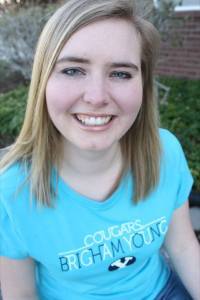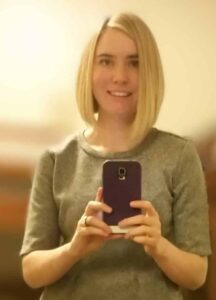Guest Post: When Women Interview to Be BYU Professors
by Rachel Noorda
Seven years ago, I interviewed to be a professor at BYU. I’d recently finished my PhD and I was excited about the interview because it was in my very specific subfield and also because it would be teaching and researching at the place where I earned my bachelor’s degree many years before. My university education began at BYU and it seemed like completing the circle to end back at BYU to start my career.
 Rachel graduating from BYU
Rachel graduating from BYU
When I was an undergrad at BYU, I didn’t have many professors who were women. But when I did, I inevitably gravitated toward them. Those women became some of my favorite people and best mentors, and they answered my questions about PhD work, wrote me letters of recommendations, and gave me research jobs on campus. I am forever grateful to them. That’s what I wanted to be for the female students at BYU.
But the interview process went very differently than I thought it would.
I was one of two final candidates for the position. My interview was a three-day process that consisted of two lunches and one dinner with faculty from the department; interviews with the department chair, dean, and a general authority; a research presentation to faculty; and a teaching demonstration to students. Intense interview processes like this are not uncommon in academia.
Over the course of the process, I experienced a multitude of what Michael Baran and Tiffany Jana have called “subtle acts of exclusion” (SAEs). That is the term I will be using, although many other terms would also apply (microaggressions, sexism and ageism, etc).
SAE #1: Weren’t you my student recently?
Since this was the same department where I had received my undergraduate degree at BYU, I had taken classes from many of the faculty who were now part of my interview process and my potential colleagues should I get the job. Many of the faculty took delight in the fact that I had my start in their department at BYU, and I enjoyed chatting with them. But others used this opportunity to subtly imply that I was too young to be a competent, knowledgeable colleague.
One particular faculty member went as far as to search through his old class lists, find my name and my picture from when I was a student of his, and then show it to everyone while we were chatting over lunch. I tried to laugh it off by saying, “Oh wow! I can’t believe you found that. That’s a blast from the past.”
To which he replied, “It was only a few years ago.” I didn’t know how to respond. A recent Women in the Workplace report showed that early-career women suffer from ageism more than any other group.
SAE #2: Minimizing accomplishments
I was very proud of the fact that I passed my PhD thesis defense with no corrections. This is a very rare thing, and I had put in a lot of hard work to my thesis writing and oral exam preparation to make this happen.
However, when someone brought this up to praise me in one of our lunch discussions, another faculty member piped in to say, “Yes, but you got your PhD in the UK, didn’t you? You wouldn’t have passed with no corrections if you did your PhD in the US; it’s much more rigorous here.”
I wish I had been more confident in myself at the time to push back on what this colleague said. But at the time, I just wilted a little and changed the subject.
 Rachel before her BYU interview
Rachel before her BYU interview
SAE #3: Faculty meetings are priesthood meetings.
On the evening of the second day, I went to dinner with members of the department. It ended up being me and six male colleagues. It was good food and we chatted about a variety of things at first, like musical talents and church callings. Then one of the faculty members said, “You know, our department meetings can be kind of like priesthood meetings. You’re going to need to speak up so you can be heard.”
He may as well have said, “Our department has very few women and is sexist, so you’ll have to fight if you want any voice or representation as our colleague.”
I stammered some weak response about being up to the challenge, but the comment shook me. On the one hand, at least they recognized how very unrepresented women were in their department, But they weren’t doing anything about it, other than to push the only women in the department to fight for whatever the powerful male department majority would give them. It made me very aware that I was different from them because I was a woman.
SAE #4: How will you uphold the patriarchy for students?
The worst part of the entire process was my interview with the general authority. He was a member of the quorum of the seventy, but no one that I had met before or was very familiar with. I was asked to have my husband come with me, so I brought him along. I was grateful to have him there because he is my #1 support, but I also wondered why he needed to be there when I was the one applying for the job, not him.
The general authority was nice enough, and he had a tidy office with lots of light. My husband and I sat down on a couch opposite the general authority’s desk. I felt guilt build inside me when he asked how often I read my scriptures, because I read them but I wasn’t always consistent about doing so daily. His reactions to my answers didn’t give anything away.
Toward the end of the interview, he asked me this: “If a female student comes to you with worries about how women do not have the priesthood, what will you say to her?”
Would he have asked me that if I had been a man? I understand that BYU is an LDS school, but asking one woman to justify to another woman why they both have so little power in the church is very frustrating.
In the end, they chose the other candidate (who was a man) for the position. I very fortunately found a tenure-track faculty job in my specialization, with amazing colleagues (including a high proportion of wonderful women).
But if BYU wants to best support women, including their own female students, some of these issues need to be addressed.
What have your experiences been with BYU? Or working for the church?
Rachel Noorda is an Associate Professor at Portland State University and director of a graduate program in book publishing there. She’s originally from Utah, but studied in Scotland and really enjoys currently living in the Pacific Northwest. She loves to bake, read, and spend time with her husband.



